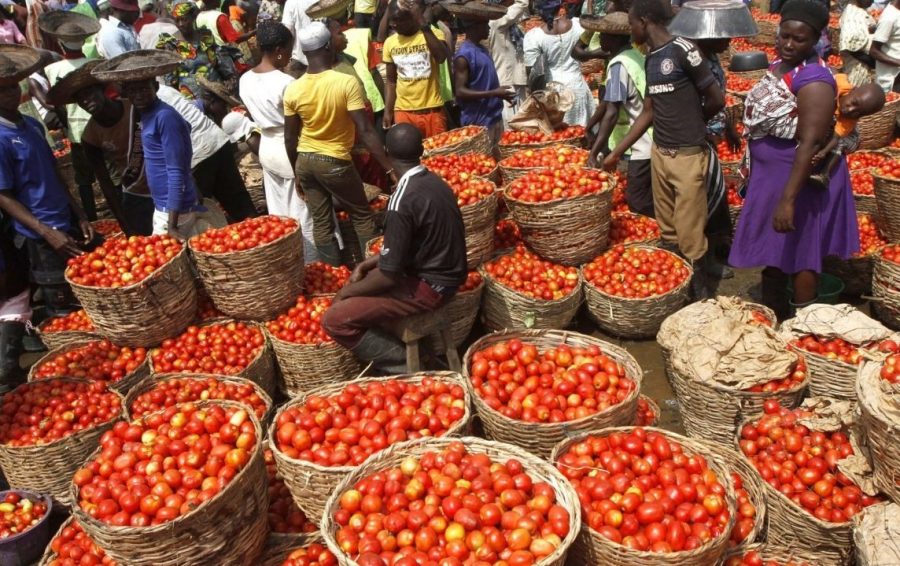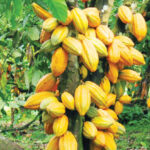Consumers across the country are presently lamenting what they call an abnormal rise in the price of tomatoes across major markets in the country.
Our correspondent, who has been monitoring the situation, reports that the scarcity of the commodity has pushed the price high by nearly 100 per cent.
Consumers said the situation impacted negatively on them, especially in the month of Ramadan.
Hajiya Ramat Azeez Kikelomo, a resident of Garam, a Niger community bordering the Federal Capital Territory (FCT), said if the situation did not improve soon, it would greatly affect many households during Sallah celebration across the country next weekend.
In Kano State, one of the major tomato farmers attributed the early rise in the price of the commodity to a recent pest attack, known as tutaabsoluta, a dangerous pest affecting the crop.
Daily Trust on Sunday reports that over N1.5 billion worth of tomato plantations are said to have been destroyed by the recent attack of the pest in the state.
As a result of the attack on big tomato farms and how it spread across other farms in the various farming areas in the state, the product became scarce in the market, which forced up its price.
Marketers and consumers are battling to get the products from all angles as the demand is increasing due Ramadan.
But experts said that aside the pest attack, every year by this time, the commodity is usually scarce as a result of the end of season and hot weather.
The experts, however, noted that the situation became worst this year because the seasonal scarcity was combined with pest attack, as well as low production in many farms in the producing states.
Daily Trust on Sunday reports that many farmers at the beginning of the season abandoned tomato farming for wheat, over the fear of the outcome of the 2023 general elections, which some think may affect the supply of the commodity to the South, where it is supplied in bulk.
When Daily Trust on Sunday visited some of the major tomato markets in Kano, they were scanty, with few produce available for sale, amidst price hike.
This is to the extent that some have resorted to buying unripe tomatoes, an incident that signifies that the season has come to an end.
In Yankaba market, some marketers said they were supplying tomato from other states as Kano’s product is ending and some were destroyed due to the pest attack.
One of the marketers, who is also the chairman of tomato sellers in the market, Mustapha Hudu Ajasco, said the product was coming from Bauchi, Maiduguri and some parts of Kano not affected by the pest.
He said a basket of fresh red tomatoes was N23,000 and still going up. This is against last week’s price, where a basket was sold between N8,000 and N10,000. He said tomato was one of the farm produce that lacked storage facilities and did not like hot weather; that is why farmers are not delving into it seriously during hot weather.
“Every day, tomato is fading out as a result of the end of its season, as well as pest attack. Because of the attack in Kano, we now supply tomatoes from Bauchi. Honestly, looking at how things are going now, we may face difficulty in getting tomatoes, especially now that Sallah period is approaching. People will buy tomatoes costly because we have no other option,” he said.
He added that they used to receive over 200 small trucks a day in their market, but from last week, it changed from 12 to 15 trucks only. He said that even what they were getting from Bauchi,
Maiduguri and some other parts of Kano would soon finish and they would rely on Zaria.
“When the supply is dropping and the demand is increasing, definitely there is going to be price hike. This is the reality and we have to accept it that way,” he said.
Speaking to Daily Trust on Sunday, some farmers in Kano said although there was pest attack in some farms, it is estimated that there would be scarcity of tomatoes due to low production. Many of them said there were various factors that affected this year’s farming that triggered its scarcity; hence the price hike.
A farmer from the Gafan area of Kura Local Government of Kano, Mallam Usman Abdullahi, said the hike in the price of farm inputs had barred many people from tomato farming as they could not invest their money and end up counting losses.
“Tomato farming is one of the most risky ventures as it cannot be stored like grains. In this year’s farming, inputs were very expensive. The fertiliser we used to buy at N15,000 is now between N28,000 and N30,000; likewise seeds, pesticides and petrol. That is why many farmers abandoned tomato and ventured into wheat farming. We are just seeing the result now, it is scarce in the market,” he said.
Also speaking, the state chairman of the Tomato Out Growers Association of Nigeria (TOGAN), Alhaji Sani Danladi Yadakwari, said apart from the decrease in production from farmers, the non-standard market of the product discouraged many people from delving into it.
He said people were afraid of going into tomato farming because “There is no guaranteed market for it. Few months ago, at the beginning of the harvest, a basket was sold at N3,000, but now, it has risen to over N20,000. Here is even better; in Lagos they are selling at N30,000.
“The pest attack is really affecting the business. In my farm, I am expected to harvest 2,000 crates per day, but due to the attack, I hardly get 100 crates. So you can see the level of the damage,” he explained.
Gov’t should implement ban on importation to save the situation
He said the only way out of the incessant scarcity and hike in the price of tomato, which occurred virtually every year, is for the federal government to implement its policy in the ban of importation of tomatoes.
He said some farmers were afraid as the federal government allowed some people to import tomatoes into the country, which will further cripple farmers’ efforts and discourage patronage of the indigenous product, adding that what is done to rice should also be done to tomatoes.
“We have the fear that tomato is still imported into the country; that is why some farmers abandoned it. This is discouraging and will not be good for the country. Instead, the government should support us and ensure that we farm tomatoes here and even export it. They should treat tomatoes as they do rice. Look at the number of rice companies we have now as a result of the decision that banned its importation,” he said.
Farmers should adopt heat-resistant variety, staggering farming
Speaking on why the scarcity is happening every year and how it can be solved, an expert and director of the Extension Department of the Kano Agricultural and Rural Development Authority (KNARDA), Gambo Isah Garko, said farmers’ failure to adopt a heat-resistant variety was contributing to the scarcity of tomatoes every year.
He said for the problem to be solved permanently, there has to be a modern system of plantation by farmers.
“Whenever there is high demand and low supply, there must be scarcity, which will lead to price hike. So, the farmers should adopt a system of farming called staggering, which is to plant separately within an interval of weeks so that the goods will keep harvesting regularly, one after another. This will really address the scarcity.
“Another solution is to use a variety that is heat-resistant.Tomatoes don’t like too much heat, which is why farmers are not planting in hot weather. But there are improved seeds that can resist heat nowadays. Although they are expensive, they are good and produce good products that will even give more profit to the famers and can address the problem we are facing with marketing,” he said.
He added that last year, during pest attack the KNARDA distributed chemicals to farmers free of charge so that they could rescue the situation. He called on the government to do the same this year and make improved seeds available to farmers in the country so as to improve tomato farming, which he described as a large industry employing thousands of people in the country.

 Join Daily Trust WhatsApp Community For Quick Access To News and Happenings Around You.
Join Daily Trust WhatsApp Community For Quick Access To News and Happenings Around You.


